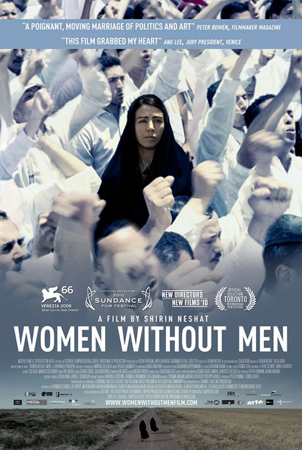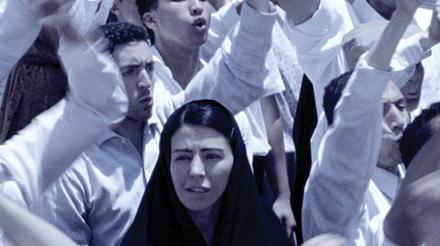Wed 7 Apr 2010
Different Strokes
Posted by Ethan under Film Review, NYC Film Critic
Comments Off on Different Strokes
Women Without Men
Directed by Shirin Neshat
Starring Pegah Ferydoni, Arita Shahrzad, Shabnam Tolouei, Orsi Toth
**1/2
Women Without Men is the kind of movie I always feel slightly guilty about not liking more. A beautifully filmed, richly allegorical picture set against the backdrop of the 1953 coup that replaced Iran’s Prime Minister with the Shah, the film has clearly been crafted with care as well as an intensely critical eye, which is more than you can say for most slapdash big-budget vehicles like, say, The Bounty Hunter, or even an enjoyable indie diversion like The Girl with the Dragon Tattoo.
The story behind the movie makes it even more impressive; based on a celebrated novella by Shahrnush Parsipur—who spent time in Iran’s notorious prison system over some of the content in the book—Women Without Men marks the directorial debut of photographer and visual artist Shirin Neshat, who has examined the changing role of women in Iranian society for almost two decades in photo exhibitions and video instillations. (Both the author and the filmmaker left Iran some time ago in order to more freely pursue their work. In fact, the film itself was shot entirely in Morocco.) Not surprisingly, the movie is filled with expertly composed images that could almost be displayed in galleries as single frames. Neshat also admirably refuses to simplify or over-explain the content she’s working with for the audience. This isn’t a movie that loudly proclaims what you should feel or think—it puts the onus of interpretation directly where it belongs…on the viewer.
If only I felt engaged enough by the film to actually want to puzzle out its various themes and meanings. For all its formal pleasures, I found watching Women Without Men to be a frustratingly uninvolving experience. And, to be honest, part of me worries that the fault lies with me rather than the film. On the surface at least, there’s nothing that Neshat has done overtly wrong here, either from a technical standpoint or on a scene-to-scene dramatic basis. The slender narrative takes place largely in a rundown orchard just outside of Tehran, which has recently been purchased by Fakhri (Arita Shahrzad) the middle-aged woman in the process of seeking a divorce from her husband, a high-ranking army officer.  Unbeknownst to her, this piece of land has otherworldly qualities which attract other damaged souls, including Zarin (Orsi Toth), a prostitute whose loathing for her profession has taken a significant mental and physical toll, and Faezeh (Pegah Ferydoni), whose fierce desire to be married has all but consumed her life. Their time at the orchard leads to a spiritual re-awakening that’s less about religion than it is empowerment. In another bit of magical realism, Fazeh’s close friend Munis (Shabnam Tolouei) commits suicide early on in the film only to seemingly rise from the dead in order to join a group of political activists that oppose the Shah’s attempts to claim power. Things come to a head on the eve of the coup, when two of these women die (or, in one case, die again) and the remaining pair returns to a city and a country that has profoundly changed.
Again, all of this sounds interesting on paper, but it just doesn’t spark onscreen, at least not for me. Maybe part of it is that is due to the way the movie’s small scope keeps the social changes swirling through Iran at the time largely offscreen. It’s hard to escape the feeling that the more interesting story is happening outside the walls of the orchard. There’s also a noticeable lack of energy in the performances, most likely because the four actresses—while quite good—are primarily playing symbols rather than fully realized characters. Neshat is clearly an exacting artist and I don’t doubt that she achieved the film she set out to make. I just wish it was a film that meant as much to me as it does to her.
Women Without Men recent played New York’s New Directors/New Films festival and will open in select cities throughout April. Visit the film’s official website to learn more.




No Responses to “ Different Strokes ”
Sorry, comments for this entry are closed at this time.